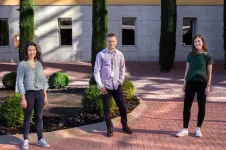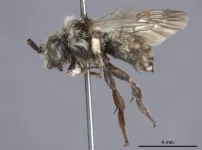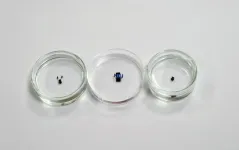(Press-News.org) A new antibody testing study examining samples originally collected through the National Institutes of Health's All of Us Research Program found evidence of SARS-CoV-2 infections in five states earlier than had initially been reported. These findings were published in the journal Clinical Infectious Diseases. The results expand on findings from a Centers for Disease Control and Prevention study that suggested SARS-CoV-2, the virus that causes COVID-19, was present in the U.S. as far back as December 2019.
In the All of Us study, researchers analyzed more than 24,000 stored blood samples contributed by program participants across all 50 states between Jan. 2 and March 18, 2020. Researchers detected antibodies against SARS-CoV-2 using two different serology tests in nine participants' samples. These participants were from outside the major urban hotspots of Seattle and New York City, believed to be key points of entry of the virus in the U.S. The positive samples came as early as Jan. 7 from participants in Illinois, Massachusetts, Mississippi, Pennsylvania and Wisconsin. Most positive samples were collected prior to the first reported cases in those states, demonstrating the importance of expanding testing as quickly as possible in an epidemic setting.
"This study allows us to uncover more information about the beginning of the U.S. epidemic and highlights the real-world value of longitudinal research in understanding dynamics of emerging diseases like COVID-19," said Josh Denny, M.D., M.S., chief executive officer of All of Us and an author of the study. "Our participants come from diverse communities across the U.S. and give generously of themselves to drive a wide range of biomedical discoveries, which are vital for informing public health strategies and preparedness."
In studies like these, false positives are a concern, particularly when the prevalence of viral infections is low, as was the case in the early days of the U.S. epidemic. Researchers in this study followed CDC guidance to use sequential testing on two separate platforms to minimize false positive results.
All of Us worked with Quest Diagnostics to test samples on the Abbott Architect SARS-CoV-2 IgG ELISA and the EUROIMMUN SARS-CoV-2 ELISA (IgG) platforms. For a sample to be considered "positive" by the research team, it had to have positive results on both platforms, which target antibodies that bind to different parts of the virus. Both tests have emergency use authorization from the FDA.
"Antibody testing of blood samples helps us better understand the spread of SARS-CoV-2 in the U.S. in the early days of the U.S. epidemic, when testing was restricted and public health officials could not see that the virus had already spread outside of recognized initial points of entry," said Keri N. Althoff, Ph.D., lead author and associate professor of epidemiology at the Johns Hopkins Bloomberg School of Public Health, Baltimore. "This study also demonstrates the importance of using multiple serology platforms, as recommended by the CDC."
Antibodies are proteins produced in the blood in response to an infection, such as a virus. They play a critical role in fighting infections and are helpful signs that a person may have been exposed to an infection in the past, even if they didn't show symptoms. In the All of Us study, researchers looked in participant samples for a type of antibodies called IgG. These antibodies do not appear until about two weeks after a person has been infected, indicating that participants with these antibodies were exposed to the virus at least several weeks before their sample was taken. In this study, the first positive samples came from participants in Illinois and Massachusetts on Jan. 7 and 8, 2020, respectively, suggesting that the virus was present in those states in late December.
The study authors noted several limitations to their study. While the study included samples from across the U.S., the number of samples from many states was low. In addition, the authors do not know whether the participants with positive samples became infected during travel or while in their own communities. Ideally, this study could be replicated in other populations with samples collected in the initial months of the U.S. epidemic and with multiple testing platforms to compare results.
All of Us expects to release more information following further analysis, and will offer participants whose samples were included in the study an opportunity to receive their individual results. The presence of antibodies in one's blood sample does not guarantee that a person is protected from the infection (has immunity), or that any such protection will last.
INFORMATION:
Deidentified data from the antibody tests will be accessible to researchers for follow-up studies in a future release of the All of Us data analysis platform, the Researcher Workbench, with privacy and security safeguards in place. Currently, the Researcher Workbench includes data from more than 315,000 participants, including information from surveys, electronic health records, wearable devices and more. For full details about data access, visit ResearchAllofUs.org.
The study was supported by All of Us and the National Cancer Institute.
ARTICLE:
Althoff KN, et al, "Antibodies to SARS-CoV-2 in All of Us Research Program Participants," January 2-March 18, 2020, Clinical Infectious Diseases, 2021; https://academic.oup.com/cid/article-lookup/doi/10.1093/cid/ciab519
About the All of Us Research Program: The mission of the All of Us Research Program is to accelerate health research and medical breakthroughs, enabling individualized prevention, treatment, and care for all of us. The program will partner with one million or more people across the United States to build the most diverse biomedical data resource of its kind, to help researchers gain better insights into the biological, environmental, and behavioral factors that influence health. For more information, visit http://www.JoinAllofUs.org and http://www.allofus.nih.gov.
About the National Institutes of Health (NIH): NIH, the nation's medical research agency, includes 27 Institutes and Centers and is a component of the U.S. Department of Health and Human Services. NIH is the primary federal agency conducting and supporting basic, clinical, and translational medical research, and is investigating the causes, treatments, and cures for both common and rare diseases. For more information about NIH and its programs, visit http://www.nih.gov.
Chemotherapy kills tumour cells by causing damage to them. One of the most effective ways of causing damage is to prevent the two DNA strands from separating so that the cellular machinery cannot read the instructions written in the genes. But sometimes, the cell manages to repair the damage and survive, evading the effect of chemotherapy. CNIO researchers have found out how the cell does that and plan to use this knowledge to enhance cancer treatments.
The key lies in a peculiar protein called PrimPol, as explained in a publication in The EMBO Journal by the CNIO's DNA Replication Group, led by Juan Méndez.
The DNA molecule harbours the genes that direct the life of the cell and, ...
The University of Ottawa has been awarded four new Canada Research Chairs (CRC) that will strengthen its expertise in artificial intelligence, health and law. The University is also proud to announce the renewal of two CRCs that will conduct leading-edge research in quantum communications and photonics.
"The Canada Research Chairs Program provides invaluable support to our researchers as they forge their paths of discovery at a world-class level," said Sylvain Charbonneau, vice-president, research. "The results of this most recent competition will ...
A review of more than 9,000 U.S. patients with severe COVID-19 infection showed less than 1% contracted the illness again, with an average reinfection time of 3.5 months after an initial positive test. Those are the findings from a study conducted by researchers from the University of Missouri School of Medicine and MU Health Care.
The researchers teamed up with the MU Institute for Data Science and Informatics and the Tiger Institute for Health Innovation to review data from 62 U.S. health care facilities. They found 63 of the 9,119 patients (0.7%) with severe COVID-19 infection contracted the virus a second time, with a mean reinfection period of 116 days. Of the 63 who were reinfected, two (3.2%) died. Patients categorized as ...
Plants evolve specialised defence chemicals through the combined effects of genes, geography, demography and environmental conditions, a study published today in eLife reports.
The findings reveal a pattern in the types of defence chemicals plants produce across Europe, and describe some of the evolutionary processes that create them.
As plants are immobile organisms, they rely on producing defence chemicals called specialised metabolites for survival. Specialised metabolites have extensive variation in their structure, such as the number of carbon molecules ...
June 15, 2021 - Canadian researchers have discovered that a bee thought to be one of the rarest in the world, as the only representative of its genus, is no more than an unusual specimen of a widespread species.
Scientists with the Canadian Museum of Nature (CMN) and York University have reclassified the mystery bee, collected somewhere in Nevada in the 1870s, as Brachymelecta californica. They note that it's an aberrant individual of a species, the California digger-cuckoo bee, that is part of a group that includes five other species. All are cleptoparasitic bees, with females that lay eggs in the nests of digger bees. Brachymelecta californica itself is known to be widespread ...
A recent UCLA clinical trial has shown encouraging results in helping daily smokers who are also heavy drinkers quit smoking and cut down their alcohol intake.
The study of 165 people tested two prescription drugs -- varenicline, for smoking addiction, and naltrexone, which is used to treat alcoholism. Studies have shown that varenicline, marketed under the brand name Chantix, may also be effective in reducing alcohol consumption.
Participants, who ranged in age from 21 to 65, smoked at least five cigarettes a day, with male participants generally consuming more than 14 drinks a week and women more than seven per week.
Over the 12-week study period, each participant received 2 milligrams of varenicline twice a day. Roughly half the group -- 83 participants -- also received a 50-milligram ...
Hippopotamus aren't the first thing that come to mind when considering epidemiology and disease ecology. And yet these amphibious megafauna offered UC Santa Barbara ecologist Keenan Stears(link is external) a window into the progression of an anthrax outbreak that struck Ruaha National Park, Tanzania, in the dry season of 2017.
Through surveys and GPS monitoring, Stears and his colleagues, Wendy Turner, Doug McCauley and Melissa Schmitt, revealed that reduced dry-season flows in the Great Ruaha River indirectly spread the disease by affecting hippo movement. The results, which appear in the journal Ecosphere(link is external), present a unique perspective on disease ecology and illustrate how anthropogenic changes can impact wildlife and human health.
The ...
A team of scientists at Nanyang Technological University, Singapore (NTU Singapore) has developed millimetre-sized robots that can be controlled using magnetic fields to perform highly manoeuvrable and dexterous manipulations. This could pave the way to possible future applications in biomedicine and manufacturing.
The research team created the miniature robots by embedding magnetic microparticles into biocompatible polymers -- non-toxic materials that are harmless to humans. The robots are 'programmed' to execute their desired functionalities when magnetic fields are applied.
The made-in-NTU robots improve on many existing small-scale robots by optimizing their ability to move ...
Is artificial intelligence the key to preventing relapse of severe mental illness?
New AI software developed by researchers at Flinders University shows promise for enabling timely support ahead of relapse in patients with severe mental illness.
The AI2 (Actionable Intime Insights) software, developed by a team of digital health researchers at Flinders University, has undergone an eight-month trial with psychiatric patients from the Inner North Community Health Service, located in Gawler, South Australia.
The digital tool is tipped to revolutionise consumer-centric timely mental health treatment provision outside hospital, with researchers labelling it as readily available and scalable.
In the trial of 304 ...
Exposure to the rhinovirus, the most frequent cause of the common cold, can protect against infection by the virus which causes COVID-19, Yale researchers have found.
In a new study, the researchers found that the common respiratory virus jump-starts the activity of interferon-stimulated genes, early-response molecules in the immune system which can halt replication of the SARS-CoV-2 virus within airway tissues infected with the cold.
Triggering these defenses early in the course of COVID-19 infection holds promise to prevent or treat the infection, ...





